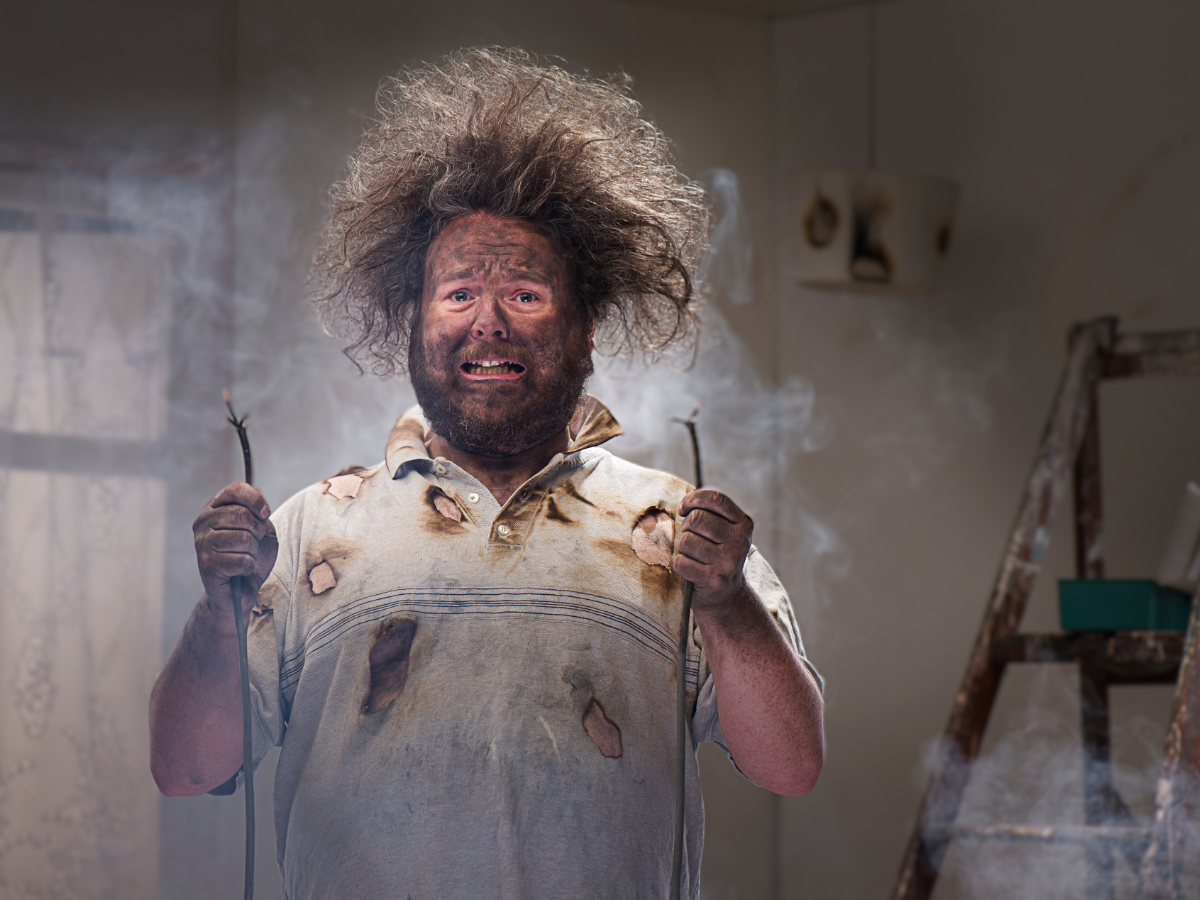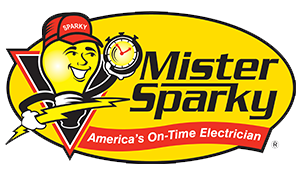What You Can and Can’t Do (Legally & Safely)
 Electrical repairs are divided into safe DIY tasks and off-limit work.
Electrical repairs are divided into safe DIY tasks and off-limit work.
Safe DIY tasks:
• Replacing a light bulb or fixture, if the wiring is in place
• Swapping out outlets and switch covers
• Installing plug-in smart devices
• Resetting tripped breakers
Off-Limit Work:
• Wiring or rewiring circuits
• Installing or replacing circuit breakers or panels
• Running new wires through walls or ceilings
• Modifying anything connected to the main electrical panel
• Installing EV chargers or large appliances
• Tampering with GFCI/arc-fault protection without understanding the risks
Even though some electrical repairs seem easy to do, it’s important to keep in mind that just because you can doesn’t mean you should.
What Electrical Work Is Safe to DIY?
Have you asked yourself, “What electrical work can I do myself?” Or are you itching to do some DIY electrical repairs? Here is some electrical work that’s safe to do yourself.
Replacing a Light Bulb or Fixture
If the wiring is already in place, it’s safe to replace a light bulb or fixture. Ensure that the new bulb has the right voltage and that the fixture is compatible. Then turn off the power, unscrew the old light bulb, and screw in the new one.
Swapping Outlet and Switch Covers
You can also swap outlets and switch overs. This is a cosmetic job only, which means no internal wiring should be involved. Simply turn off the power, remove the old outlet or cover, and put in the new one.
Installing Plug-In Smart Devices
Installing plug-in smart devices is another electrical repair you can undertake. Just make sure you use UL-listed products. The UL (Underwriters Laboratories) mark is a designation on devices that shows the device has been safely tested and certified. This helps reduce electrical hazards, such as shocks or fires.
Resetting Tripped Breakers
A circuit breaker disconnects or “trips” when it’s electrically overloaded. A fuse box, on the other hand, contains a wire that will melt when the circuit is overloaded. Whereas a breaker can be switched back on, a blown fuse must be replaced.
You can reset your tripped breaker by flipping it back to reset it. First, unplug the appliance that tripped the breaker and find the tripped breaker in your home’s electrical panel. It should be the one in the “off” position. Then, simply push the switch to “on.”
If your breaker keeps tripping, this is a red flag. Call an electrician instead of continually resetting it.
Gray Areas: Legal but Risky DIY Electrical Work
The above are safe DIY electrical repairs. However, if you’re asking, “Can I wire a light myself?” or “Is it legal to install an outlet?”, those answers can get a little trickier. While these tasks are legal, they may be risky.
Installing a new light switch or outlet
If you’re replacing existing hardware, you may need the same permits required by local electricians. In addition, you’ll need to follow the updated local codes.
Replacing a thermostat
If you’re not rewiring or altering the structure, replacing a thermostat yourself should be fine. Just be sure to follow the local codes in your area. It’s also important to remember that any incorrect wiring could damage your HVAC system or void your warranty.
Installing a ceiling fan
Although you can install a ceiling fan yourself if the electrical box is rated for weight and power, it’s not recommended. An improper installation could damage your electrical system and cause a severe electrical shock. The electrical work must also comply with local codes, which could mean restricting DIY attempts.
DIY Electrical Work You Should Never Attempt
Any time you need to make changes to your home’s electrical system, you should never attempt to do it yourself. Electrical work that requires a licensed electrician includes:
• Wiring or rewiring circuits
• Installing or replacing circuit breakers or panels
• Running new wires through walls or ceilings
• Modifying anything connected to the main electrical panel
• Installing EV chargers or large appliances
• Tampering with GFCI/arc-fault protection without understanding the risks
Understanding Electrical Codes and Permits
 To understand why it’s so dangerous to tamper with your electrical system, you should be familiar with some common electrical terms and rules and why they’re important.
To understand why it’s so dangerous to tamper with your electrical system, you should be familiar with some common electrical terms and rules and why they’re important.
• NEC code: The National Electrical Code (NEC) is a document that provides safety guidelines for anyone doing electrical work. This standardized document not only ensures safety that can prevent electrical hazards, but it also provides an industry standard across the country.
• Electrical permit: An electrical permit is a legal permit from a local government that allows you to perform electrical work on a property. An electrical permit is required when there’s a new addition to a property, a new construction, or an electrical update. It’s also necessary when the property is converting from one system to another.
• Home inspection fail: A home inspection fail occurs when a home’s electrical system doesn’t meet the required local codes and safety standards. A failing inspection can result in increased repair costs, safety risks, and delays in real estate transactions.
• DIY electrical law: In most states, the DIY electrical law stipulates that homeowners can do minor electrical repairs by themselves, such as swapping outlets and changing light bulbs.
However, more complicated tasks need a licensed electrician. In addition, some complex DIY electrical repair jobs still need to be inspected by a certified inspector to ensure the work complies with local codes.
Top 7 Signs You Need to Call an Electrician ASAP
Wondering if you can perform a repair yourself or not? Here are seven signs you need to call an electrician immediately.
• Buzzing outlets or switches
• Warm wall plates
• Repeated breaker trips
• Lights flickering across multiple rooms
• Burning smells
• Shock or zap when plugging something in
• Aluminum wiring or knob-and-tube in older homes
DIY Electrical Safety Checklist
If you have a minor electrical repair that you feel comfortable doing on your own, here’s a safety checklist.
• Turn off the power at the breaker
• Use a voltage tester to ensure the power is off. Never trust the switch!
• Wear insulated gloves and shoes to prevent electrical shocks
• Never work alone in case something goes wrong
• Double-check wire connections
• Label everything before removing wires so you don’t improperly rewire everything later
Why Hiring a Licensed Electrician is Worth It
If you’re having a problem with your electrical system, it’s always better to hire a licensed electrician. Licensed electricians are familiar with the local codes and safety requirements. They also come with years of experience and can ensure an efficient, professional job.
In addition, if you attempt to do the job yourself, you’ll probably void your insurance, meaning any additional damage you incur will have to be paid out of pocket. Lastly, when a licensed electrician performs the job, you’ll have peace of mind that your electrical system complies with the local codes and is updated, increasing the value of your home.
FAQs
Can I legally do electrical work in my own home?
Yes, you can legally do minor electrical work in your own home. For more complex repairs, though, you need to hire a licensed electrician.
Do I need a permit to replace an outlet?
No, you don’t need a permit if you’re replacing an outlet, so long as there’s no wiring involved or you’re not adding outlets.
What’s the fine for unpermitted electrical work?
The fine for unpermitted electrical work in Florida is typically double the permit fee. However, there could be additional fines if the work doesn’t comply with local codes.
Is DIY electrical work covered by homeowners insurance?
No, DIY electrical work is not covered by homeowners’ insurance. Most policies require a licensed electrician to perform any electrical repair or modification to a property.
Not Worth the Risk? We’re Here to Help
 If you need electrical repair work in Daytona, FL, don’t put up with any Malarky! Hire a licensed electrician for the job.
If you need electrical repair work in Daytona, FL, don’t put up with any Malarky! Hire a licensed electrician for the job.
At Mister Sparky, we offer free estimates and electrical safety inspections so you can be sure your electrical system is safe and complies with the local codes. Doing it yourself could mean facing multiple repairs further down the line or damaging part of your electrical system. However, when you hire our team, you’ll get lasting results and long-term value.
Contact Daytona’s on-time electrician today to schedule an appointment. We have nearly 30 years of experience in the industry!